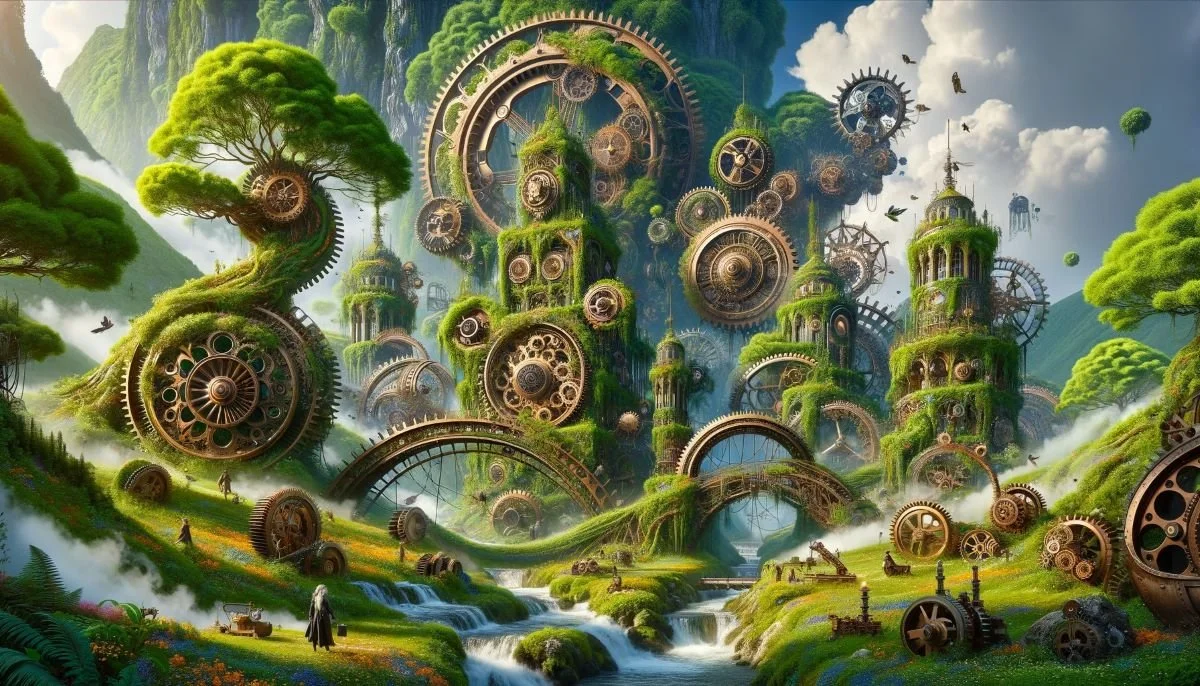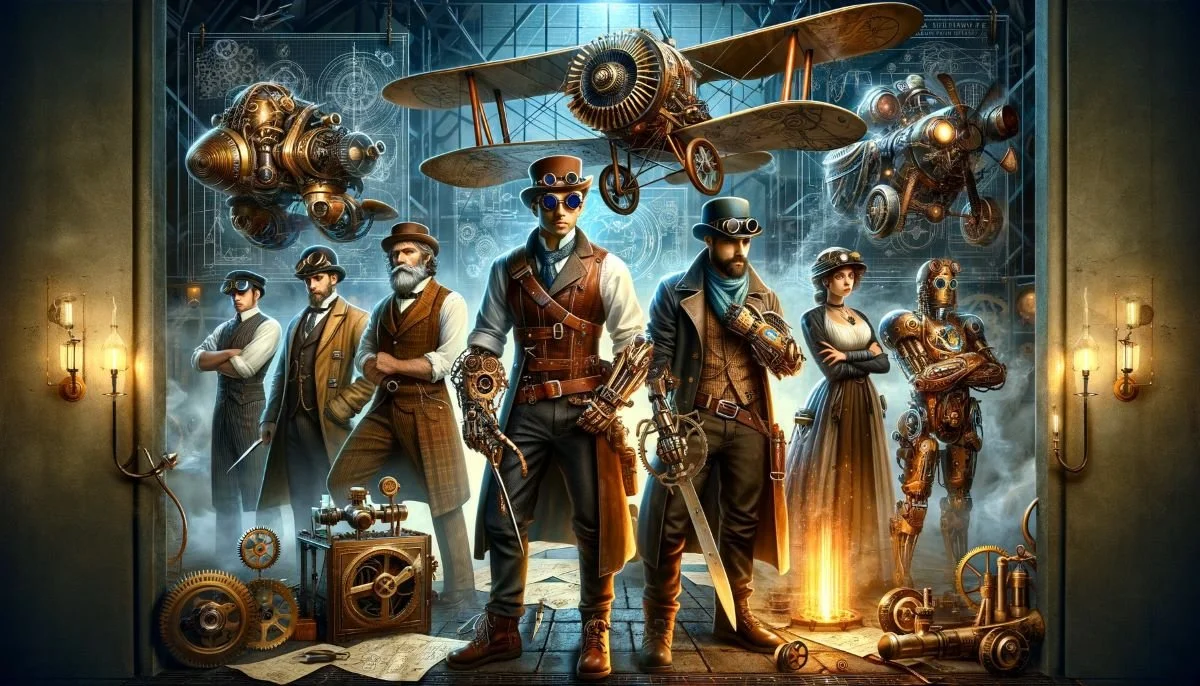Welcome to the crossroads where the whirling gears of Steampunk Fantasy meet the green and growing tendrils of environmental themes. In this article, we’re going to explore how the steam-powered world of airships and automatons intertwines with nature, and how this genre serves as a unique platform for discussing environmental issues. So, let’s don our brass goggles and embark on a journey through smoggy cities and lush landscapes, examining how Steampunk not only reflects but also influences our relationship with the environment.
Understanding Steampunk Fantasy
Defining the Genre
Welcome aboard the airship of imagination, where we’re about to journey through the fantastical world of Steampunk Fantasy. Picture this: a realm where the elegance and societal intricacies of the Victorian era meld seamlessly with futuristic innovations, all powered by the churning and hissing of steam. It’s like someone took the 19th century, decked it out in brass goggles, and handed it a ray gun. Steampunk isn’t just a genre; it’s a grand, ongoing experiment in “What if?” What if the future happened earlier and was powered by steam and gears? The result is a captivating blend of the old and new, the familiar and the fantastical.
Historical Roots and Inspirations
Now, let’s wind back the clocks and peek into the past to uncover the roots of Steampunk Fantasy. Our story begins during the Industrial Revolution, a pivotal era that transformed societies with the power of steam and steel. This was when humankind took a giant leap forward, and the world buzzed with the excitement of new possibilities. But it wasn’t all shiny and bright. The era was also marked by smog-choked cities and the growing pains of progress, a dichotomy that Steampunk narratives often explore.
The cobbled streets of 19th-century London, with their blend of grandeur and grime, serve as a perfect backdrop for many Steampunk tales. Here, the genre finds its heart, drawing inspiration from both the technological marvels of the time and the environmental repercussions they brought. Visionaries like Isambard Kingdom Brunel and Nikola Tesla become the unsung heroes of these narratives, their groundbreaking inventions reimagined into fantastical devices that spark adventures and provoke thought.
In Steampunk Fantasy, the smoke-filled factories and steam-belching engines are more than just scenery; they’re characters in their own right, representing humanity’s relentless pursuit of progress. But as these stories unfold, they also pause to reflect on the environmental cost of this advancement, weaving a cautionary tale about the balance between creation and conservation.
As we explore Steampunk’s enchanting world, we’re not just spectators; we’re participants in a dialogue between the past and the future, witnessing a genre that’s as deeply rooted in history as it is soaring towards tomorrow. So, keep your goggles at the ready and your imagination primed; the adventure through Steampunk Fantasy is just beginning, and every steam whistle and gear turn beckons us deeper into its captivating narrative.
The Environmental Narrative in Steampunk
Steampunk Fantasy is not just a mirror to a fantastical past but also a lens focusing on the future of our environment. It’s where the ecological battles of yesterday meet the green dreams of tomorrow.
A Reflection of Industrial Impact
As we navigate the foggy streets and steamy skies of Steampunk worlds, we often encounter the darker side of industrialization. Steampunk doesn’t shy away from portraying the environmental consequences of unchecked progress. The genre, born in the shadow of the Industrial Revolution, inherently reflects on the impact of that era’s rapid technological advancement. It’s a world where the air is thick with smog, rivers run black with waste, and landscapes are scarred by relentless mining.
In these narratives, the billowing smokestacks and clanking machinery serve as powerful symbols of pollution and resource depletion. Steampunk stories frequently use their fantastical settings to highlight real-world environmental issues, drawing parallels between their world and ours. They prompt us to consider: If this is the path we once walked, what does the road ahead look like? By looking back, Steampunk urges us to reflect on our current environmental trajectory and consider how we might forge a different, more sustainable future.
Eco-Conscious Characters and Societies
But it’s not all doom and gloom in the world of Steampunk. Amidst the backdrop of industrialization, we often meet characters and societies that embody themes of environmental consciousness. These are the tinkerers and dreamers who see the world not just as it is but as it could be. They’re the inventors crafting sustainable technologies out of cogs and steam, the communities cultivating lush gardens amidst the metal and smoke, and the rebels fighting to preserve what’s left of nature.
These characters and societies represent a hopeful undercurrent in Steampunk Fantasy, one that acknowledges the problems of industrialization but also imagines solutions. They’re a reminder that innovation doesn’t have to come at the expense of the environment, and that with creativity and determination, it’s possible to build a world where technology and nature exist in harmony.
In Steampunk, the future is not predetermined. It’s a world of endless possibilities, where every invention is a step toward a different outcome, and every character can play a part in shaping what comes next. So as we journey through these steam-powered landscapes, let’s draw inspiration from the eco-conscious minds within them. Let’s imagine how we, too, can be inventors and guardians of a world where progress and nature thrive together. The gears of change are in our hands.
The Power of Steampunk in Environmental Discourse
Steampunk Fantasy, with its unique amalgamation of the past’s aesthetics and the future’s technology, holds a powerful position in environmental discourse. It’s not merely an escape from reality but a bridge to understanding and influencing it.
Using Fiction to Spark Real Change
Fiction has always been a potent tool for reflecting society’s hopes and fears, and Steampunk is no exception. Its narratives, set against a backdrop of industrial excess and ecological change, resonate deeply with contemporary environmental concerns. Through its stories, Steampunk can engage readers and viewers in discussions about sustainability, conservation, and the impact of human activities on the natural world. It makes the issues accessible and compelling, often portraying them through the lens of adventure and invention.
Moreover, Steampunk can inspire real-world action by showcasing characters who are inventors, scientists, and activists. These figures often embody a spirit of innovation and resilience, using their wits and resources to combat environmental degradation and propose alternative ways of living. They serve as models for how individuals can contribute to a more sustainable future, turning the genre from mere entertainment into a source of inspiration and motivation.
Steampunk as a Mirror and a Beacon
Steampunk serves as a mirror reflecting our environmental predicaments. It amplifies the consequences of industrial recklessness, illustrating a world where nature is pushed to the brink. But within this reflection, it also offers glimmers of hope. Steampunk worlds, despite their sometimes dystopian settings, are often filled with incredible innovation and resourcefulness. They show that change is possible and that a balance between progress and preservation can be achieved.
The genre acts as a beacon, guiding us towards a vision of a better future. It imagines societies where steam power is harnessed sustainably, where cities are green and thriving, and where humanity lives in harmony with the environment. These aren’t just fanciful dreams; they’re potential blueprints for our future. By presenting these ideas in compelling and imaginative ways, Steampunk encourages us to think creatively about our environmental challenges and to seek solutions that are as inventive as they are effective.
In essence, Steampunk doesn’t just entertain; it enlightens and empowers. It’s a genre that challenges us to look at our world differently, to see the past’s mistakes, the present’s challenges, and the future’s possibilities. Through its blend of history and fantasy, Steampunk becomes a powerful tool in environmental discourse, one that can spark real change and illuminate the path to a more sustainable and hopeful future. So, let’s embrace the power of Steampunk, not just as a source of escapism, but as a catalyst for environmental awareness and action. The gears of change are turning, and each of us has a role to play in the grand machine of progress.
Innovations and Trends in Steampunk Environmentalism
Steampunk isn’t just a static genre; it’s a vibrant, evolving narrative constantly being shaped by new ideas and innovations, especially when it comes to environmentalism. Let’s explore the emerging themes and the role of the Steampunk community in shaping a greener future.
Emerging Themes in Literature and Media
In recent years, Steampunk literature and media have begun to weave in more explicit environmental themes, reflecting a growing consciousness about our relationship with the planet. Authors and creators are integrating imaginative solutions to ecological issues within their works, making the genre not just a platform for escapism, but for exploration of sustainable futures.
One such emerging theme is the use of alternative energy sources. Imagine solar-powered airships gliding through the skies, their panels gleaming in the sun, or wind-powered automatons tending to crops. These aren’t just fanciful ideas; they represent a real desire to envision a world where technology and nature coexist harmoniously.
Another exciting trend is the portrayal of bio-engineered gardens and ecosystems within urban Steampunk settings. Picture a city where greenery and gears intertwine, where rooftop gardens provide food and factories are designed to be eco-friendly. These narratives offer a hopeful glimpse into what our own cities might one day become, blending Victorian-inspired aesthetics with cutting-edge ecological design.
The Role of Community and Culture
The Steampunk community isn’t just a group of enthusiasts; it’s a vibrant culture of creativity and collaboration. With its DIY ethos and penchant for repurposing and innovation, this community plays a crucial role in promoting environmental awareness and sustainable practices.
Across the globe, Steampunk creators are crafting not just costumes and gadgets, but also messages about sustainability. They’re upcycling materials, turning old into new in true Steampunk fashion, and in doing so, they’re demonstrating the value of reusing and repurposing. It’s a form of artistic expression that’s not only visually striking but also environmentally conscious.
Moreover, the community’s gatherings and events often serve as platforms for discussing and sharing ideas about sustainability. Workshops on creating eco-friendly costumes, panels about integrating green themes into Steampunk narratives, and discussions about the genre’s potential to inspire real-world change are just a few examples of how the community is actively engaging with environmental issues.
In essence, the Steampunk community isn’t just observing the genre’s evolution towards a more eco-conscious narrative; they’re actively participating in it. Through their creativity, ingenuity, and passion, they’re helping to shape a future where Steampunk isn’t just about looking back at a bygone era but about looking forward to a sustainable, green future. They’re proving that with a little imagination and a lot of determination, the gears of change can turn towards a brighter, greener tomorrow.
The Path Ahead: Steampunk’s Role in Shaping Environmental Futures
As we stand amidst the whirling gears and hissing steam of Steampunk, it’s clear that this genre has the potential to play a significant role in shaping our environmental future. Let’s dream together and consider the path ahead.
Envisioning a Steampunk-Inspired Future
Imagine a future where the visionary essence of Steampunk has permeated our world, influencing the way we think about technology, nature, and sustainability. In this Steampunk-inspired future, cities are marvels of green engineering, with verdant skyscrapers powered by the sun and wind, and streets lined with lush gardens. Airships glide gracefully through the skies, propelled by clean, renewable energy, and the seas are navigated by ships with sails of solar fabric.
In this world, the Steampunk ethos of innovation and creativity has led to a revolution in sustainable living. People are makers and tinkerers, crafting their solutions to environmental challenges. Communities are built on principles of cooperation and respect for nature, integrating green spaces and technology in harmony.
This isn’t a distant, unattainable fantasy. Elements of this Steampunk-inspired vision are already emerging in our world today, from urban green spaces to renewable energy technologies. The genre’s blend of historical inspiration and futuristic innovation provides a unique framework for imagining and working towards a more sustainable world.
Your Part in the Narrative
Now, dear reader, consider your role in this unfolding narrative. Steampunk is more than a genre to be consumed; it’s a perspective, a mindset, and a call to action. You, too, can be part of the movement towards a more sustainable future, influenced by the creativity and imagination of Steampunk.
Engage with the themes of Steampunk in your life. Let its blend of past and future inspire you to think differently about technology and the environment. Whether you’re an artist, a writer, a tinkerer, or simply someone who cares about the planet, you can contribute to this narrative.
Create, innovate, and share your visions of a Steampunk-inspired future. Upcycle and repurpose in true Steampunk fashion, turning the old into something new and beautiful. Participate in discussions about sustainability and technology, and let the imaginative spirit of Steampunk guide you to think outside the box.
And most importantly, take action in the real world. Support sustainable initiatives, advocate for environmental causes, and be a part of the community working towards a greener future. Your actions, no matter how small, can make a difference.
In the story of our planet’s future, each of us has a part to play. So, let’s take inspiration from the world of Steampunk Fantasy and work together to craft a future where technology and nature exist in harmony. The gears of change are in our hands, and the path ahead is ours to shape. The adventure is just beginning, and your chapter is waiting to be written.
A World of Possibilities
As we reflect on our journey through the realm of Steampunk and its dance with environmental themes, it’s clear that this genre is much more than an escape into a world of brass and steam. It’s a conversation with our past and a dialogue about our future, urging us to creatively and thoughtfully shape the world we live in.
Steampunk isn’t just about what was; it’s about what could be. It challenges us to look at our history of innovation and asks, “What next?” It mixes the thrill of discovery with a cautionary tale of progress, pushing us to think about the consequences of our creations.
This genre does more than enchant; it inspires. It encourages us to dream big but also to consider our impact. As we close this chapter, let’s take the spirit of Steampunk with us. Let it be a reminder that our actions today write the story of tomorrow. The future is ours to imagine and ours to create. Let’s make it a world where technology and nature thrive together, and where our fanciful dreams can lead to positive change. The adventure continues, and it’s ours to shape.






0 Comments